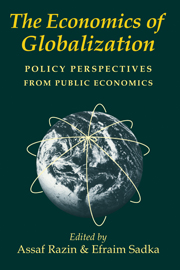Book contents
- Frontmatter
- Contents
- Preface
- List of Contributors
- Introduction
- I International Mobility of Technology
- II Capital Flows and Exchange-Rate Misalignment
- III Tax Incentives and Patterns of Capital Flows
- IV Limits to Income Redistribution in Federal Systems
- V Tax Harmonization, Tax Coordination, and the “Disappearing Taxpayer”
- VI Political-Economy Aspects of International Tax Competition
- 12 Factor Taxation, Income Distribution, and Capital-Market Integration
- 13 Interjurisdictional Tax Competition: A Political-Economy Perspective
- VII Migration of Skilled and Unskilled Labor
- VIII Fiscal Aspects of Monetary Unification
- Index
13 - Interjurisdictional Tax Competition: A Political-Economy Perspective
Published online by Cambridge University Press: 28 January 2010
- Frontmatter
- Contents
- Preface
- List of Contributors
- Introduction
- I International Mobility of Technology
- II Capital Flows and Exchange-Rate Misalignment
- III Tax Incentives and Patterns of Capital Flows
- IV Limits to Income Redistribution in Federal Systems
- V Tax Harmonization, Tax Coordination, and the “Disappearing Taxpayer”
- VI Political-Economy Aspects of International Tax Competition
- 12 Factor Taxation, Income Distribution, and Capital-Market Integration
- 13 Interjurisdictional Tax Competition: A Political-Economy Perspective
- VII Migration of Skilled and Unskilled Labor
- VIII Fiscal Aspects of Monetary Unification
- Index
Summary
Introduction
The academic literature on tax competition has shed light on the fiscal externalities that can arise if sovereign jurisdictions select their fiscal policies in an uncoordinated fashion in situations in which their economies are linked by commodity or factor trade flows. From a welfare-economics perspective, those externalities could have undesirable effects. With respect to commodity taxation, welfare-maximizing governments could choose to depart from second-best optimal rate structures in an attempt to manipulate the terms of trade in their favor (Mintz and Tulkens, 1986). When factor taxes are involved, jurisdictional governments could be induced to choose suboptimal source-based taxes in order to prevent the tax base and the associated rents from moving outside their jurisdictions' borders (Gordon and Wilson, 1986; Zodrow and Mieszkowski, 1986).
The majority of this literature has examined tax competition in an institutional vacuum. Typically it has been assumed that fiscal choices are made by some fictional jurisdictional authority that aims to maximize a well-defined objective such as national welfare. This type of approach finds its roots in the welfare-based tradition of public economics, combining the central-planning paradigm of the literature on optimal tax design with the insight, borrowed from the theory of noncooperative games, that uncoordinated responses typically lead to inefficient equilibria - two paradigms that seem rather at odds with each other.
Arguably, tax and spending choices are not the result of welfare maximization by benevolent central planners; this simple observation has fueled the research on public choice for the past 30 years.
- Type
- Chapter
- Information
- The Economics of GlobalizationPolicy Perspectives from Public Economics, pp. 291 - 310Publisher: Cambridge University PressPrint publication year: 1999



